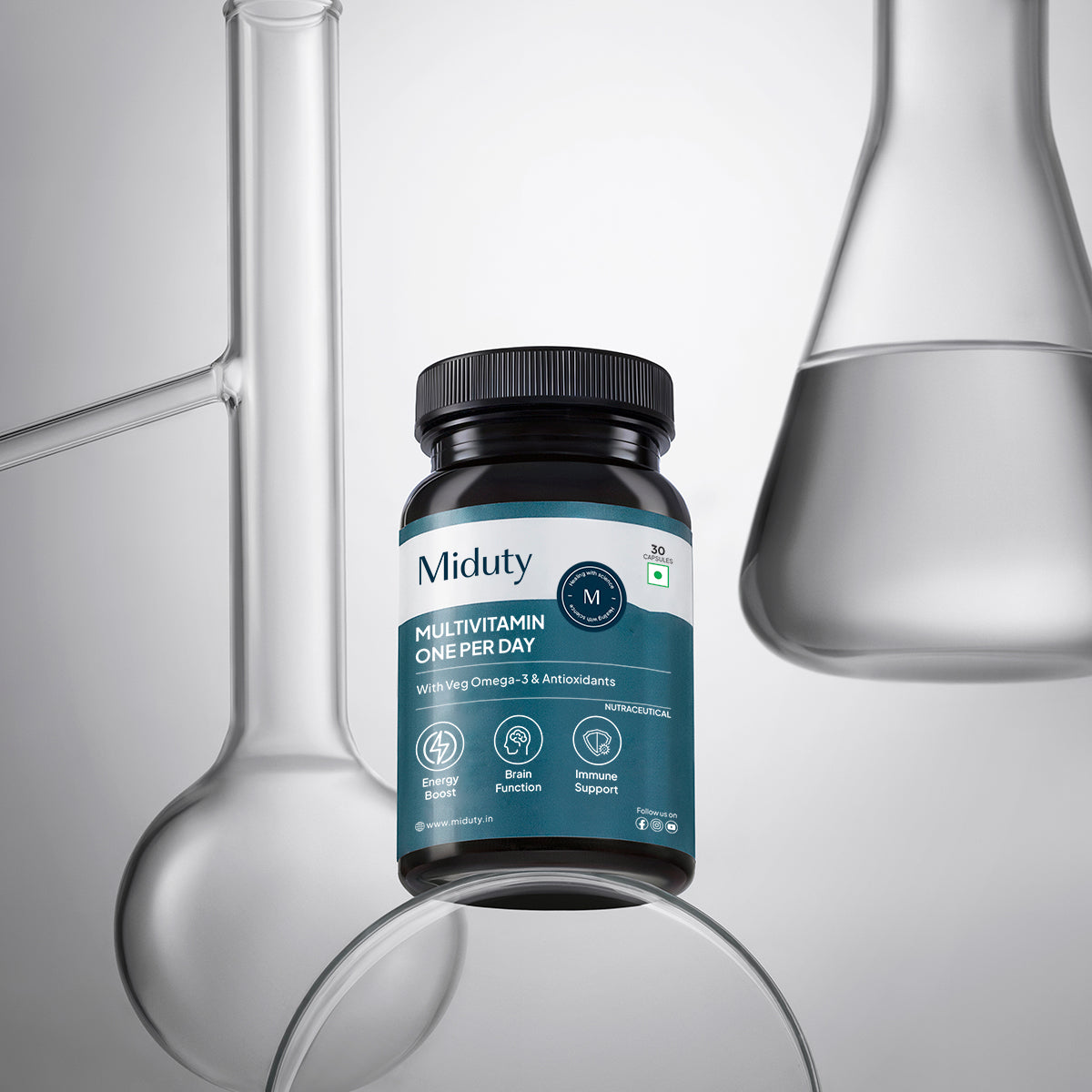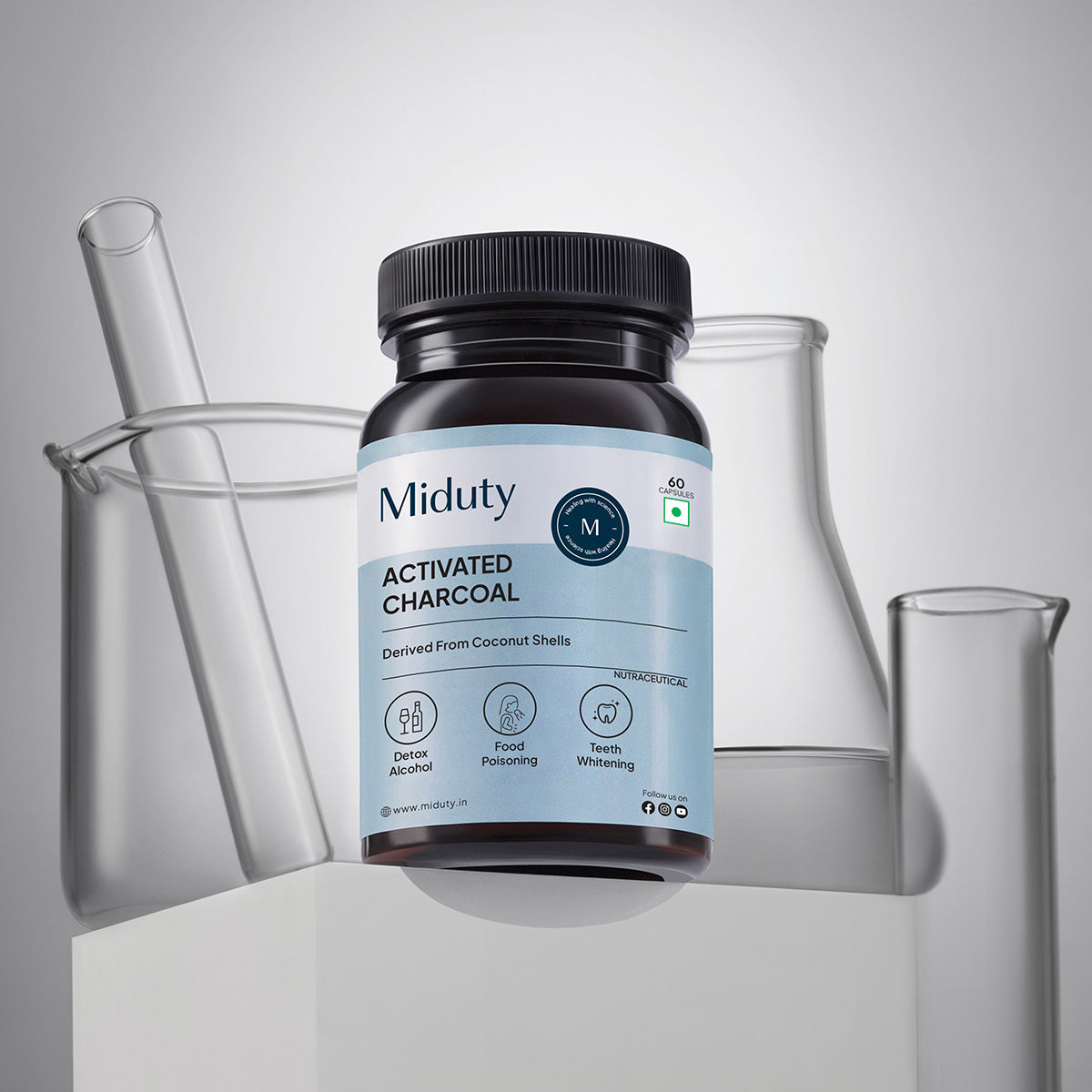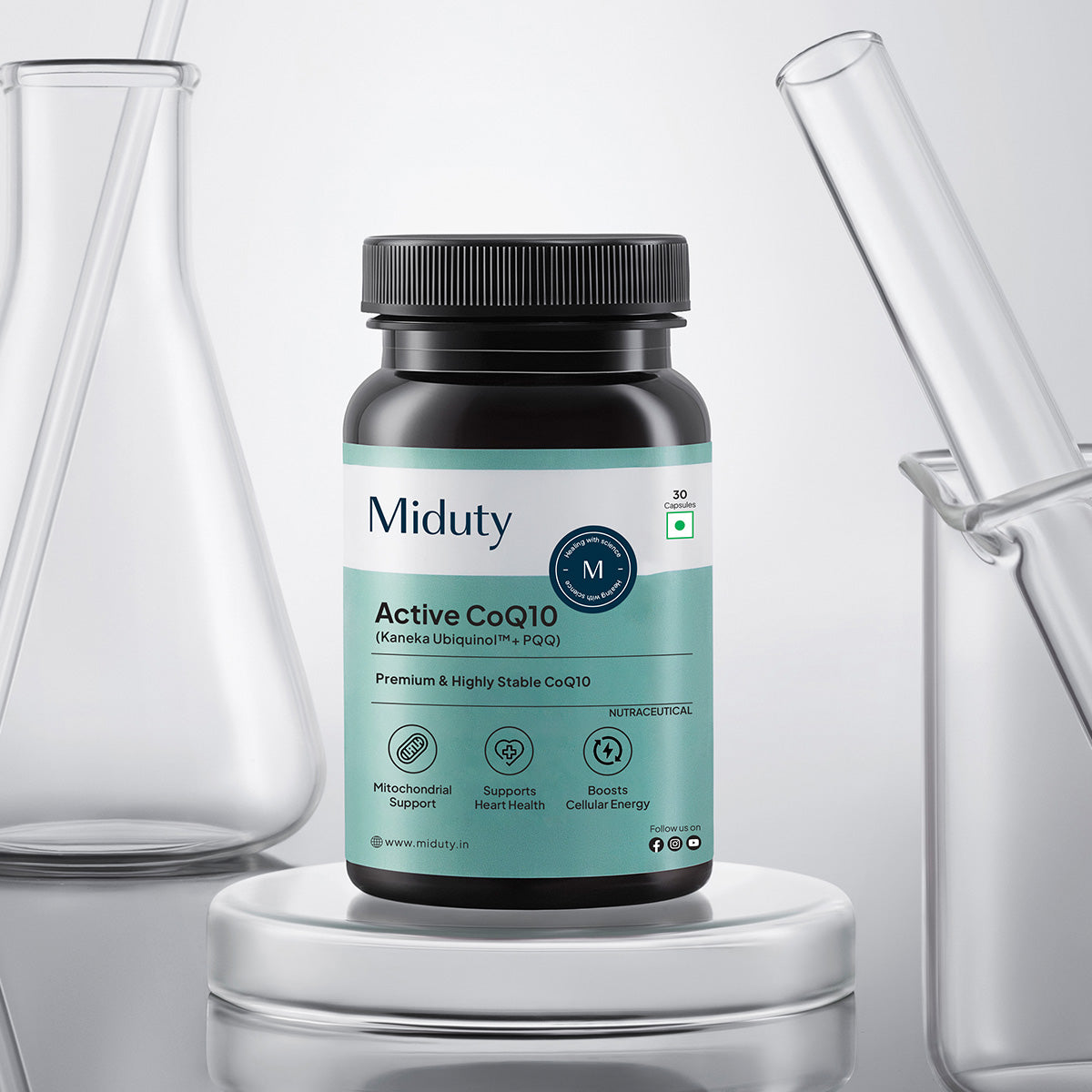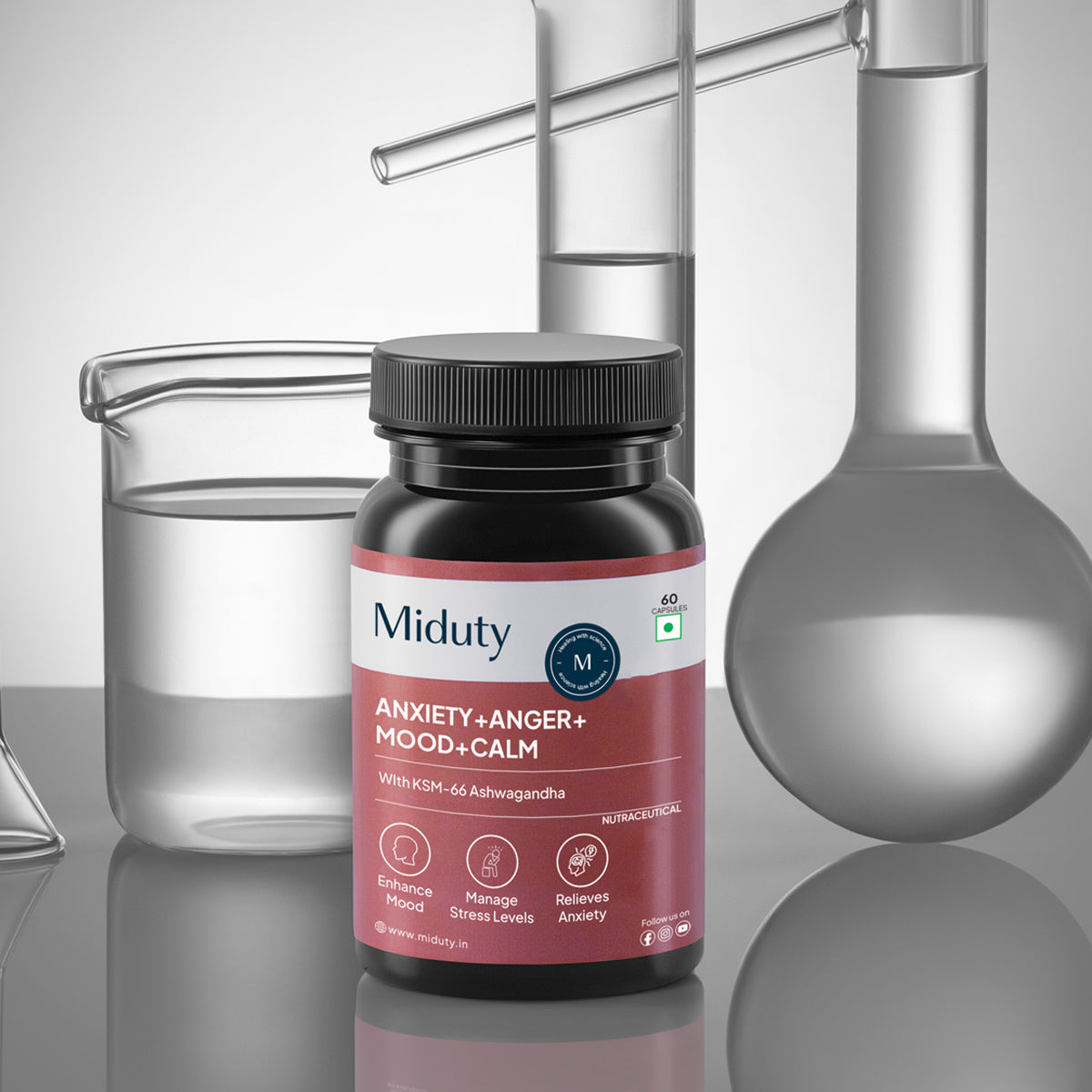
Omega 3 Benefits for Hair Growth: How It Reduces Hair Fall Naturally
Hair fall isn't just a physical change, it affects how we feel about ourselves. When strands start showing up on the pillow, in the shower, or tangled around the brush, it can bring anxiety and frustration. We look for fixes everywhere, shampoos, oils, masks, serums but most solutions only work on the surface.
What we often forget is this: hair growth doesn't begin on the scalp; it begins inside the body. And one nutrient plays a powerful role in strengthening hair from within and reducing hair fall naturally — Omega-3 fatty acids.
Let's explore what Omega-3 is, how to know if you're deficient, and how it can transform hair health from the roots upward.
Key Takeaways
1. Hair fall doesn't start on the scalp — it starts inside the body. Topical products offer surface-level relief, but internal nourishment is essential for long-term hair growth and reduced shedding.
2. Omega-3 fatty acids especially EPA and DHA play a crucial role in hair health. They support cell repair, reduce inflammation, improve scalp circulation, and nourish hair follicles to encourage thicker, stronger growth.
3. Omega-3 deficiency is common and directly linked to hair problems. Signs like brittle hair, slow growth, split ends, dry scalp, anxiety, and dull skin often indicate low Omega-3 levels.
4. The benefits of Omega-3 are rooted in biology. It reduces inflammation, balances hormones, strengthens the scalp barrier, and supports stress management, addressing the root causes of chronic or sudden hair fall.
5. Food sources are helpful, but supplementation is often necessary. Marine sources offer the highest EPA and DHA levels, and a high-quality, third-party-tested Omega-3 supplement provides reliable support for those experiencing active hair fall.
What Is Omega-3?
Omega-3 fatty acids are essential fats, meaning the body cannot produce them on its own and must obtain them through food or supplements. These fats support brain health, heart function, hormone balance, inflammation control, and cellular repair, including the cells that make up our scalp and hair follicles.
There are three key types of Omega-3:
|
Type |
Main Sources |
Primary Role |
|
EPA |
Marine |
Reduces inflammation and supports scalp health |
|
DHA |
Marine |
Nourishes cells and improves follicle function |
|
ALA |
Plant |
Converts to EPA/DHA in small amounts |
For hair growth, EPA and DHA are the most effective, which is why marine-based Omega-3 is usually recommended during active hair fall.
Signs You Might Be Low in Omega-3
Most modern diets contain far more Omega-6 (refined oils) than Omega-3, which leads to imbalance. When the body lacks Omega-3, inflammation increases and hair health is one of the first areas affected. You may be deficient if you notice:
- Sudden or persistent hair fall
- Dry, frizzy, and brittle hair
- Slower hair growth
- Itchy or flaky scalp
- Increased hair breakage
- Split ends
- Dull hair lacking shine
- Brittle nails
- Dry skin or rough patches
- Mood swings, anxiety, or low concentration
If multiple signs resonate, increasing Omega-3 may be one of the most supportive steps for your hair.
How Omega-3 Benefits Hair Growth and Reduces Hair Fall
Omega-3 works at the internal root causes of hair fall rather than masking symptoms. Its benefits are multi-layered and long-term.
1. Deep Nourishment of Hair Follicles
Omega-3 improves blood circulation to the scalp, ensuring follicles receive oxygen and essential nutrients. This extends the growth phase of hair, strengthens roots, and supports thicker, denser new growth. It also helps revive dormant follicles over time, which can contribute to better hair density. [1]
2. Reduces Scalp Inflammation
Inflammation caused by stress, pollution, dandruff, lifestyle, or harsh products suffocates follicles and disrupts growth. Omega-3 has a naturally soothing, anti-inflammatory effect, helping create a healthier scalp environment for new hair to grow. By calming irritation, it reduces itching, flakiness, and sensitivity that often accompany chronic scalp inflammation. [2]
3. Supports Hormone Balance
Conditions like PCOS, postpartum shifts, thyroid imbalance, and high stress can lead to sudden or long-term hair fall. Omega-3 helps regulate hormones by lowering inflammation, improving stress response, and supporting insulin sensitivity. This hormonal support stabilizes the hair growth cycle, reducing excessive shedding and promoting steady regrowth. [3]
4. Strengthens Hair Strands
Omega-3 aids natural oil balance and hydration throughout the hair shaft, which means the strands stay supple, elastic, and resilient. With consistent intake, hair becomes less prone to breakage and split ends, retains moisture more effectively, and gradually develops a shinier, smoother texture. This is why people who increase their Omega-3 intake often notice their hair looks healthier even before new growth becomes visible because the quality of existing strands starts improving from within.
5. Helps Reduce Stress-Related Shedding
Stress activates hormones that push hair from the growth phase to the shedding phase. Omega-3 supports the nervous system, helping reduce stress-induced hair fall.
Best Food Sources of Omega-3 for Hair Health
A healthy diet plays a big role in restoring Omega-3 balance in the body. Including the right foods consistently can nurture the scalp, strengthen hair follicles, and support thicker hair growth over time.
Marine Sources (highest EPA and DHA)
- Salmon
- Sardines
- Mackerel
- Tuna
- Anchovies
- Cod liver oil
- Shrimp
- Seaweed (vegetarian-friendly)
Plant Sources (rich in ALA)
- Flaxseeds
- Chia seeds
- Walnuts
- Pumpkin seeds
- Hemp seeds
- Avocado
- Edamame and soybeans
- Kidney beans
While plant foods are valuable, the body converts ALA to EPA/DHA very inefficiently. So for anyone with ongoing hair fall, a supplement is usually the most reliable way to raise Omega-3 levels.
Who Benefits the Most from Omega-3 for Hair Health?
Groups that typically see the strongest results include:
- People with chronic stress, PCOS, postpartum hair fall, thyroid fluctuations, or nutrient deficiencies
- Vegetarians and vegans, due to low intake of EPA and DHA from diet
- Individuals exposed to pollution, hard water, and frequent chemical or heat hair treatments
- Women in perimenopause or menopause, needing hormonal and hydration support
How Omega-3 supports noticeable hair improvements:
- Reduces inflammation
- Balances hormones
- Strengthens the scalp barrier
- Nourishes hair follicles from deep within
Rather than acting as a temporary surface-level remedy, Omega-3 works internally — helping hair regain strength, thickness, and long-term growth.
How to Choose the Best Omega 3 Supplement?
When choosing an Omega-3 supplement for hair growth, focus on purity, absorption, and potency. An Omega 3 supplement powered by Triple-Strength Salmon Fish Oil, Antarctic Krill Oil, EPA, DHA, and Astaxanthin delivers a highly effective blend of essential fatty acids that the body can use immediately to soothe inflammation, support hormonal balance, and strengthen hair follicles from within. Ensure the supplement is third-party tested for safety and designed for easy digestion. Since the body requires Omega-3 and Omega-6 in a 1:1 ratio, the right Omega-3 supplement helps correct today's common imbalance caused by excessive Omega-6 intake — creating the ideal internal environment for strong, dense, and healthy hair growth.
Conclusion
Hair fall can feel overwhelming, but it isn't a problem that starts on the scalp — it begins inside the body. Most topical products only offer temporary surface relief, whereas Omega-3 works at the root level, where true restoration happens. By reducing inflammation, balancing hormones, improving scalp health, and deeply nourishing hair follicles, Omega-3 creates the ideal internal environment for strong, dense, and healthy hair growth. Whether hair fall is linked to stress, postpartum changes, PCOS, thyroid imbalance, nutritional gaps, or environmental damage, increasing Omega-3 intake gives the body the support it needs to repair and regrow.
Hair growth is a gradual process, but with consistency, the transformation is real: reduced shedding, improved strand strength, visible new growth, and healthier texture overall. When you nourish your body from within, your hair reflects that care. For anyone seeking long-term hair revival, Omega-3 is a smart and science-backed place to begin.
Frequently Asked Questions on Omega 3 for Hair
Q1 - Does omega-3 help hair growth?
Yes, Omega-3 can significantly support hair growth by calming scalp inflammation, deeply nourishing hair follicles, and potentially extending the hair growth cycle. It promotes thicker and stronger strands, improves overall hair density, and enhances shine by boosting hydration from within. Omega-3 also helps manage concerns like dandruff and dryness by supporting the scalp's natural oil balance, creating a healthier environment for continuous hair growth.
Q2 - Which is better, biotin or omega-3?
Research indicates that adding Omega-3 supplements to your routine may help reduce hair thinning and promote healthier, shinier hair. If you're experiencing hair loss, the most effective results come from a well-rounded approach that includes balanced nutrition, stress management, and guidance from a medical professional.
Q3 - How much omega-3 to take for hair growth?
For hair growth support, a daily intake of 1–3 grams (1000–3000 mg) of combined EPA and DHA is generally recommended. It can be helpful to begin with a lower dose, such as 1000 mg, and increase if needed. Always consult a healthcare professional before starting a new supplement to determine the dosage that best suits your individual needs. Taking Omega-3 with a meal that contains healthy fats can also improve absorption.
Q4 - What happens if I take omega-3 everyday?
Omega-3 offers many proven health benefits and can be taken daily, but it's essential to stay within the recommended dosage to avoid potential side effects. One important consideration is blood pressure. High amounts of Omega-3 may lower blood pressure further, which can be risky for individuals who already have naturally low blood pressure or are taking medications for it.
Q5 - What should you not mix omega-3 with?
Omega-3 supplements should not be taken alongside blood thinners such as warfarin, aspirin, or clopidogrel because the combination can increase the risk of bleeding. Caution is also advised when taking Omega-3 with blood pressure medications or NSAID pain relievers like ibuprofen, since these can also influence blood clotting and blood pressure. It's important to speak with a healthcare provider before combining Omega-3 with any other medication to ensure safety and the right dosage.
References














